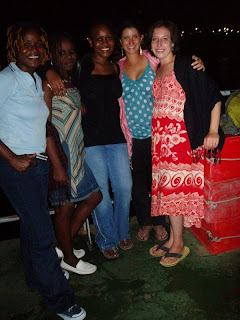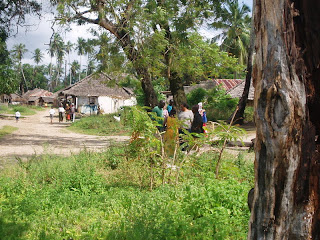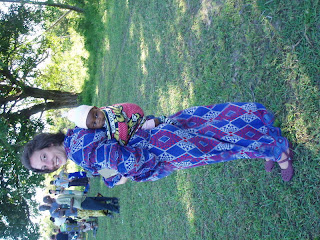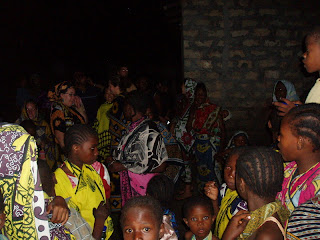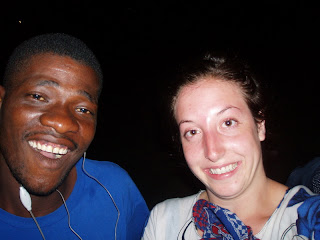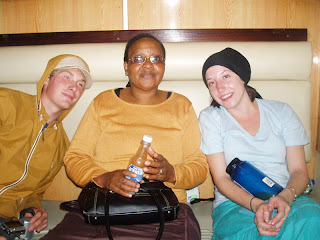At long last I am back in Nairobi, back at a computer and full of stories (as well as covered in bug bites) after two of the most full weeks of my life. I have so much to
report, and will try to give you all a good picture.
To begin with, we left Nairobi and took a legit 17-hour train ride to Mombasa on one of those trains that was literally from the 1800’s. We ate breakfast and dinner in the dining car, and shared four person compartments complete with bunk beds (and straps so as not to fall off the top bunk!) I roomed with Samantha, Klarissa and Kyla—who is becoming a very dear friend. Our room became the unofficial meeting/party room (don’t ask me how.) After dinner there were about 15 students, 5 Swahili teachers (who were traveling with us) and Odoch crammed into this tiny room “dancing” to music and drinking “juice” (ala mango with some vodka.) It was a blast, but I have to say, 15 hours later I was ready to get off—although seeing the country side via a train that moved about 10 miles an hour was quite incredible.
After we arrived in Mombasa we went to the market (still in the same clothes, unshowered and dripping from the heat) to shop for gifts to bring our families in the village, as well as kangas and mumus—traditional clothing. We then took a 2-hour bus ride and an hour ferry ride to Bodo, which is in Kenya’s South Coast. After unloading the bus, which was greeting by what seemed like the entire village, Mary (our program coordinator/group mother) just called out our names, handed us two jugs of water, a mosquito net and two roles of toilet paper and sent us off with our family. My mother immediately grabbed my wrist, and about 10 children quickly clamored to carry my bags, and I was dragged (or guided) to our hut, while my mother spoke rapidly in Kiswahili. Upon arriving at our hut we put my stuff in a room, which I assumed was mine, and my mother once again grabbed my wrist and began to drag me around the hut, showing me the washroom, the toilet/hole, all the while speaking at light speed in Swahili. Unsure of anything that she wanted me to do, I alternated between responding with ndyo (yes) and asante (thank you) coupled with what I am sure was a blank stare. She then dragged me to a mat in the center of the courtyard, and indicated I should sit. The sun was fast setting, and as it is Ramadan and this was a very Muslim village I gathered that the family was preparing to break the fast. A man who I assumed was my father appeared, as well as my brothers Ramah and Isa, my aunt (at least that was what I was told, more on this later) Fatuma, my grandmother, my older brother Hassan and later his wife Elizabeth who, thank god, spoke perfect English! However, at this point, in my first night, no one spoke a word of English, and I sat there unsure of how to do anything—how to sit, talk, eat, wash…and these huge platters of food appeared—chapati, rice, beans with coconut, cassava and meat, one for the men and another for the women who were seated on separate mats, but no utensils. I looked around, unsure of how to begin, until I saw everyone dig in with their hands—so I took a deep breath and just copied them. I will say, eating rice and beans with my hands for the first time—I made a mess, although I was trying desperately to pretend that all this was perfectly normal. Now, well I much prefer to eat without utensils, they’re really unnecessary, and once you get the hang of it—using your hands is actually neater. But anyhow. That night I wanted to cry. Everything seemed so foreign, sitting in a grass hut, eating with my hands, with a very limited understanding of the language 8,000 miles away from home. This night it really hit me that I am in such an entirely different world, a world that is so difficult to understand unless you have lived inside of it. A world whose simplicity I gained unlimited appreciation for. After dinner, what seemed like half the village came over to greet me, and again, speak quickly in Swahili. After what seemed like forever of this, I was taken to my room, given a kanga, and I assumed, was supposed to go to bed. So I did. Exhausted, overwhelmed and wishing I could just ask someone how everything worked.
I woke up in the morning covered in bug bits, as my mosquito net was too small for my bed. Upon examining the bites, well some were quite strange, so I quickly got dressed in the kangas I’d brought with the intention of going to school to show Mary. I was about to walk out the door when my mom (who was already awake, I shared a room with her and with Fatuma) began speaking fervently in Swahili, and called Fatuma over who joined in—both making frantic hand gestures, to which I, once again, gave a blank stare and tried to say “I have to go to school.” To no avail. They took me back into my room. Removed the clothes I had donned, wrapped me in a kanga, and took me out to the washroom. I protested, saying I’d showered last night, but my aunt began to bathe me, dousing me in hot water. Afterwards, I was again lead back to my room, where they dressed me. A quick side note: during our stay in the village I invented a new verb: to mumu, or to be mumued. This means to be forced to wear/dressed in a mumu, a loose fitting, sometimes okay, but usually hot, long, and often horribly ugly dress (think bad 1980’s prom) with about 6 petticoats underneath, and a kanga around your head. After I was deemed “presentable” Fatuma brought in a loaf of white bread cut into little sandwiches covered in about an inch of butter. She indicated that I had to eat. By now I got the picture that unless I ate, I wasn’t leaving. So I ate one, motioned that I was full, and thought that would be that. Nope. They sat there and watched, protesting each time I said I was full, until I realized that unless I ate the whole loaf—I would sit there itching all morning. So I gulped, and chowed down, and then ran out the door, about to throw up. At school, I had 6 jiggers (little insects that go into your feet and lay eggs) removed, and found out that in addition to mosquito bites, I also had bed bugs. Let’s just say it was a rough start to life in the village.
Later that day, I met my sister Elizabeth (whom I love, by the way) and I went home to study during a break, during which, once again my mom and Fatuma began to rapidly talk in Swahili, only this time Elizabeth could translate. They wanted to know what was wrong with me, as I’m 21, unmarried and without children (Elizabeth is also 21, married and with a baby, and is pregnant again.) They wanted to know why I was in school instead of looking for a husband. I tried to explain that things work differently in America-but they were convinced I must have some hidden malady, or some undesirable quality. After arguing about this for a while, my mama took away my books, dressed me again, and sent me out visiting in order to socialize and thus find a husband. That day I had 6 proposals of marriage, and 3 matches arranged by my family. Ay. I went to talk to Mary—who tactfully visited my family, and by the time I got home from afternoon classes, things had calmed down at home.
Now all these foreign behaviors may seem off putting, but as I got to know my family, and the people in the village I saw that all of this was done with love, with the intention of making me happy. Bodo is an incredibly poor village, but each day my family would dress me in new clothes, give me the best food (even though they were fasting) and even gave me their bed to sleep on. My Mama Matime became a dear friend, we began to be able to communicate better—and starting joking about all the things I did wrong (I constantly made fun of mazungus) and she told Elizabeth to tell me that should I need anything, to just ask, and to have no fear, as she and my baba (father) would provide me with love and care. She taught me how to cook chapatti, how to weave a mat—and had such a contagious laugh and enjoyment for life. One night (a little later, when my Swahili was better) she and I sat up talking, laughing, and singing Swahili songs—and she made me promise to some day return to my African mother and family. And they really did become my family—my “aunt” Fatuma (really my father’s second wife) gave me my Bodo name, Fatuma Mdogo (which means small Fatuma), and would take me around. Ramah, my 18-year-old brother appointed himself my personal tour guide and introduced me to all his friends (who soon became part of my constant entourage). Within four days I couldn’t walk around the village without Saidi and Bakari, two brothers aged 13 and 14 who constantly professed their love and fought about who got to marry me (they were so funny), Subhiti and Ali (two great guys who helped with the program, more on them in a minute), my 10 year old best friend and mchumba (fiancée) as I joked named Alfani about 8 other village boys aged 5-11. Odoch would laugh each morning at my entourage, and I left leading with 12 proposals of marriage. What can I say…but on a serious note…I really loved the people. My dad was so nice, we joked all the time, and Elizabeth became such an amazing friend and confidante. I even taught my mom and Fatuma to swim—as they didn’t believe that women were physically capable of doing so, nor did they thing women were capable of playing soccer. It was such a cool moment when they came to see me play in our SIT/Wazungu vs. The Villagers game—they cheered like crazy. And yes. I played soccer. And I assisted in scoring a goal—but damn, they were really incredible.
Here is a typical day in my life in the village. I wake up in my hut around 5:30, go outside and do my business in my hole—a somewhat precarious situation. I’d then take a bucket shower, be mumued, eat breakfast which my mom made each day (often chapatti because I loved it) and walked about 2 minutes to school. Walking in the village is amazing. Everyone yells your name an greets you, and walking 10 feet can take about 10 minutes. As soon as I stepped out of my door my entourage swarmed me, and Alfani would carry my backpack to school. Upon arriving I would swiftly remove all my petticoats and store them for the day—and would put them back on before I went home. This became a running joke—especially with our Swahili teachers, but I’m sorry—a mumu is hot enough! We then had Swahili class from 7 am until 12 noon, and my classroom was on this porch, so we could watch the mothers carrying water on their heads and the children playing. After Swahili we were free and as the village was right on the Indian ocean I’d usually go swimming for about an hour before lunch, eat, read or study or just hang, maybe do yoga by the beach (if I was in the mood for an audience, as within 5 minutes half the village would be watching) and then I’d go home for afternoon visiting. We’d then go around to people’s houses and say hi, and they’d come to us. This is what I’m saying—the pace of life in the village is so slow that the emphasis is all on personal relationships. I felt like just part of a big extended family. We’d then break the fast together, and sit and talk as a family (which I was more able to do as the week went on). Afterwards, Ramah and I would go check out the activity in the street. Nights in the village were magical. There are a thousand kids running around, and everyone is just hanging out. At around 8:00 we’d all congregate around this one house (Mama Pole’s, the one house with electricity) where about 10 little boys between the ages of 6 and 12 would come with their home made drums and just rock out with Swahili songs. We would all dance, and soon the whole village would be on this one porch. Then a bunch of us would go inside, and have a Bob Marley dance party to an old music video. Still singing, “One Love, One Life,” all of us students, all our siblings and friends and about 100 kids would go down to the beach and go for a night swim.
I learned so much in these 12 days. About the meaning and importance of loving, kind, open personal relationships—Africans don’t have so many of the stiff formalities or steps that we Westerners often go through before becoming close to someone. They talk freely about their feelings, their problems…and act with a generosity that is really mind blowing. The simplicity of life actually allowed for such depth of experience—every moment is full, no matter if you are just cooking, sitting, talking, walking…you really savor each moment without rushing onto the next. I realized that we really don’t need so much of what we have, and maybe would be happier without all these things—perhaps we’d be more in touch with ourselves and with our communities. Living here made me want to live in a community like this. A place where people look out for one another, a sister is not just someone to whom you are related to by blood but also someone whom you love, elders give children their time and advice, without pressuring or imposing their own values. Individuality is appreciated and people are taken and loved for who they are—quirks and all. Children are not coddled, but given responsibility and freedom (they play by themselves all day, and often you see 3 year olds with their baby siblings on their backs in a kanga). Children are not treated as if they are fragile or breakable, but just allowed to live and let live. Goats, cows and chickens wander freely, until their owners go and find them. And everything is done in the spirit of giving. In the village—one family doesn’t enjoy their food if they know another has nothing—sharing and giving are the names of the game. When I left, my family gave me a hand woven rug, a dress (mumu), a handmade fan, and a kanga—I was so touched (and I gave them some things in return.) As we left, I cried, as I told my mom I didn’t want to leave her, hugged my dad, Fatuma Mkubwa (as she was called after they had named me) and promised to return someday. And I will—to my Bodo family—because that is what the village became.





